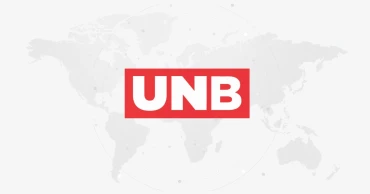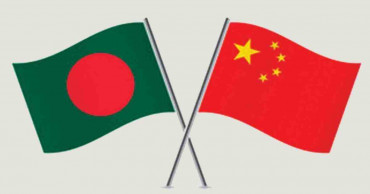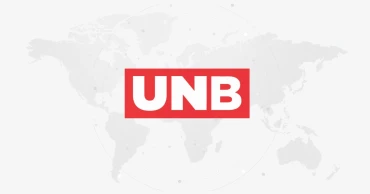Diplomatic Correspondents Association, Bangladesh (DCAB)
2025: Moin, Mamun elected DCAB president, general secretary
AKM Moinuddin, Special Correspondent of United News of Bangladesh (UNB), and Md Arifuzzaman Mamun, Diplomatic Correspondent of Amader Shomoy, have been elected president and general secretary respectively of the Diplomatic Correspondents Association, Bangladesh (DCAB) for the year 2025.
Ashiqur Rahman Apu, Chief of Correspondents of ATN News, has been elected vice-president.
Rubaet Hasan, Deepto TV Diplomatic Correspondent; Morshed Hassib Hasan, Diplomatic Correspondent of Channel 24, and Atiqur Rahman, Dainik Jababdihi Diplomatic Correspondent, have been elected joint secretary, treasurer and office secretary respectively unopposed.
On the other hand, Khurram Zaman, Diplomatic Correspondent of Amader Natun Somoy; Md Bashir Ahmed, Daily Amar Desh Diplomatic Correspondent, Mizanur Rahman, Daily Manabzamin Diplomatic Correspondent, Md Tanzim Anwar, BSS Special Correspondent and Rased Mehedi, Views Bangladesh Editor, have been elected executive members unopposed.
DCAB awards inaugural media prizes to 3 members
The Annual General Meeting (AGM) and election were held on Tuesday.
Outgoing President and Dhaka Tribune Special Correspondent Nurul Islam Hasib presided over the AGM where outgoing General Secretary Ashiqur Rahman Apu and Treasurer Atiqur Rahman presented their reports.
Chief Election Commissioner Shafiqul Karim announced the election results after vote counting.
Daily Observer Business Editor Nizam Ahmed assisted him in conducting the elections.
1 year ago
EU Indo-Pacific strategy is not for confrontation, says its special envoy
European Union (EU) Special Envoy for the Indo-Pacific Gabriele Visentin on Friday said their strategy is all about “cooperation not confrontation.”
“So, this strategy is also about scaling up and diversifying our political and economic partnership across the Indo-Pacific. We want to uphold international law and multilateralism,” he told diplomatic correspondents during an interactive session at Jatiya Press Club.
He said EU wants to deepen their cooperation with democratic like-minded partners.
Diplomatic Correspondents Association, Bangladesh (DCAB) organized the session attended by Deputy Head of Mission of the European Union to Bangladesh Jeremy Opritesco, DCAB President Rezaul Karim Lotus and its General Secretary AKM Moinuddin.
Read:Dhaka invites more investments from Seoul
The special envoy said the EU’s engagement in the Indo-Pacific is to cooperate whenever possible but to protect whenever necessary.
He claimed that their strategy is inclusive and open to all their partners wishing to cooperate with the EU and it does include China.
3 years ago
DCAB celebrates International Women’s Day amid calls for gender equality
Speakers at a function here on Tuesday laid emphasis on paying utmost attention to gender equality and keep talking on the barriers to ensure that no one is left behind.
They highlighted the urgency of working together for equality everyday which is good for society and economic growth when everyone desires a more sustainable tomorrow.
Diplomatic Correspondents Association, Bangladesh (DCAB) hosted the event at the Foreign Service Academy auditorium marking the International Women’s Day.
Read:DCAB pays tribute to Bangabandhu at Dhanmondi 32
Secretary (East) at the Ministry of Foreign Affairs Mashfee Binte Shams spoke as the chief guest at the event while Ambassador of Switzerland Nathalie Chuard and Ambassador of Sweden to Bangladesh Alexandra Berg von Linde spoke as special guests.
Additional Foreign Secretary and Rector of FSA Asad Alam Siam, Chief of Protocol M Amanul Haq, Director General (Public Diplomacy wing) Mohammad Harun Al Rashid and DG (Consular & Welfare Wing) Seheli Sabrin, among others, joined the event.
3 years ago
Bangabandhu's portrait hung at DCAB Lounge first time in 24 yrs
Diplomatic Correspondents Association, Bangladesh (DCAB), for the first time since its inception, has hung the portrait of Father of the Nation Bangabandhu Sheikh Mujibur Rahman at the "DCAB Lounge," the Ministry of Foreign Affairs. In its first meeting on Thursday, the newly elected DCAB Executive Committee, led by its President Rezaul Karim Lotus and General Secretary AKM Moinuddin, unanimously took the decision to hang the portrait of Bangabandhu inside the "DCAB Lounge".
Read:Lotus, Moin elected DCAB President, GS
4 years ago
Will follow next polls very closely amid Bangladesh’s growing importance globally: EU
Ambassador and Head of Delegation of the European Union (EU) to Bangladesh Charles Whiteley on Monday said they will be following the next general election “very closely” because the international community is “very interested” in what happens in Bangladesh amid its growing engagement globally as a developing economic power house.
“I think we’ll be following it very closely. Why we’ll be following it very closely is not because we want to interfere but the international community is very interested in what happens in Bangladesh,” he said.
The Ambassador said everybody has a stake in what happens in that election in Bangladesh which is a strategic part of this region and a developing economic power house where ties are developing.
The EU envoy made the remarks while responding to a question at “DCAB Talk” held in a city hotel. Diplomatic Correspondents Association, Bangladesh (DCAB) President Pantho Rahaman and its General Secretary AKM Moinuddin also spoke at the event.
Read: GSP-plus vulnerability criteria: BGMEA thanks EU for removing 7.4% import-share threshold
Ambassador Whiteley said the key word around elections is exactly the “process” and elections are not events.
4 years ago
Election should be Bangladesh-led process: Dickson
British High Commissioner to Bangladesh Robert Chatterton Dickson on Wednesday said anything related to election should be a Bangladesh-driven and Bangladesh-led process, noting that it is not foreigners to say how the election should be held here.
“It’s not for the foreigners to say how the election should be carried out,” he said, adding that it is a matter for the Bangladeshi people to decide.
The High Commissioner said there is plenty of expertise and talent in Bangladesh to make the election a Bangladesh-driven process reflecting the values of the country’s constitution.
The British envoy made the remarks while responding to a question at “DCAB Talk” held at Jatiya Press Club.
Diplomatic Correspondents Association, Bangladesh (DCAB) hosted the event. DCAB President Pantho Rahaman and its General Secretary AKM Moinuddin also spoke at the event.
High Commissioner Dickson said it would be good to have an election that is transparent and openly contested.
Read: Dickson lauds Bangladesh's efforts on climate front
He thinks it is important that all the voices and all political parties are able to participate in the elections and are able to have confidence in the electoral process.
The High Commissioner referred to the Bangladesh constitution and laid emphasis on fulfilling the constitutional ambition.
4 years ago
Would never ask anybody to make a choice: Australia on global initiatives
Australian High Commissioner to Bangladesh Jeremy Bruer on Thursday said his country greatly respects Bangladesh’s independent foreign policy towards its engagement in various global initiatives, noting that Australia never asks anybody to make a choice.
"We welcome that approach. We respect greatly Bangladesh's independent Foreign Policy approach. We would never ask anybody to make a choice," he said recalling the foreign policy established by Father of the Nation Bangabandhu Sheikh Mujibur Rahman - Friendship to all, malice to none.
The High Commissioner made the remarks while responding to questions at "DCAB Talk" organized virtually by the Diplomatic Correspondents Association, Bangladesh (DCAB) highlighting issues related to regional geopolitics.
Read:Rohingya repatriation: Dhaka seeks Moscow's support
Issues related to Quad (Australia, India, Japan and the US), China's Belt and Road Initiative (BRI) and Indo-Pacific Strategy (IPS) came up at the event apart from bilateral and Rohingya issues.
Bangladesh has already joined the China-led BRI and interested in economic aspects of any global initiative like the IPS.
DCAB President Pantho Rahaman and its General Secretary AKM Moinuddin also spoke.
4 years ago
Ready to offer more support if Covid situation deteriorates in Bangladesh: China
Chinese Ambassador to Bangladesh Li Jiming has said China is ready to help Bangladesh with more medical supplies, including medical oxygen, if the situation gets worse as it is facing the second wave of Covid-19.
“China is ready to offer more, if needed,” he said, recalling how Bangladesh and China helped each other in dealing with the first wave of Covid-19.
Read:Chinese Embassy invites essays from Bangladeshi friends
Ambassador Li said they will do whatever they can during the second wave of Covid-19 in Bangladesh.
He said this pandemic unseen in a century is a global challenge, and past experience keeps reminding them that only through cooperation within the international community they can embrace victory.
“Bangladesh has done what it can to fight the pandemic, and it’s my strong conviction that with the joint efforts of the people of Bangladesh and government, and the help of the international community, Bangladesh’s V-Day over Covid-19 will be just around the corner,” said the Chinese Ambassador.
He made the remarks during a virtual programme organised by the Diplomatic Correspondents Association, Bangladesh (DCAB) on Monday. DCAB President Pantho Rahaman and its General Secretary AKM Moinuddin also spoke at the event.
The Ambassador said it is believed that the safe and reliable Chinese vaccine will play a positive role in the construction of Bangladesh’s anti-epidemic defence line, help the people of Bangladesh to overcome the epidemic, and continue the friendship story between the two countries.
He said, “The virus respects no boundary, and we’re all in this together. Solidarity and cooperation are our most powerful weapon in this war.”
The envoy said China hopes all parties will take real action, provide more vaccines to developing countries, including Bangladesh, and contribute to the equitable distribution and application of vaccines across the world so that we can defeat the virus at an early date.
Some 500,000 doses of Covid-19 vaccines gifted by the Chinese government to Bangladesh will arrive in Dhaka on Wednesday.
Ambassador Li said it is a concrete step towards honoring President Xi Jinping’s pledge of making Covid-19 vaccines a global public good, a solid action taken by both sides towards building a community with a shared future for mankind, and a powerful measure to implement the consensus reached in the recent virtual meeting of Foreign Ministers of China, Afghanistan, Bangladesh, Nepal, Pakistan and Sri Lanka on Covid-19.
Read:5 lakh doses of Chinese vaccine to arrive on May 12: Envoy
This vaccine gift (Sinopharm Covid-19 vaccine) is produced by Beijing Bio-Institute of Biological Products Co Ltd, a subsidiary of China National Biotec Group.
The World Health Organization (WHO) listed the Sinopharm COVID-19 vaccine for emergency use, giving the green light for this vaccine to be rolled out globally. The Sinopharm product is an inactivated vaccine called SARS-CoV-2 Vaccine (Vero Cell).
He said its efficacy for symptomatic and hospitalised disease was estimated to be over 79%, all age groups combined and its easy storage requirements make it highly suitable for low-resource settings.
The envoy said it is also the first vaccine that will carry a vaccine vial monitor, a small sticker on the vaccine vials that change color as the vaccine is exposed to heat, letting health workers know whether the vaccine can be safely used.
Last year, at China’s most trying moments, Bangladesh was among the first countries to donate medical supplies to China in a great act of valuable support.
When the epidemic situation in China eased, China supported Bangladesh’s fight against the virus through various means including gifting medical supplies and sending medical experts.
China offered to gift vaccines to Bangladesh in February but the Embassy did not get the EUA (Emergency Use Authorization) from the government of Bangladesh until April 30.
Though facing difficulties of huge domestic demand and a tight supply of international market, China decided to give priority to ensuring that the vaccines arrive in Bangladesh as soon as possible, said the Ambassador.
He said although it was the May Day holiday in China (five days), many Chinese workers worked overtime and sacrificed personal rest time to rush out these vaccines in less than two weeks.
Read:Beijing wants Dhaka not to join Quad
The Ambassador said it is under the leadership of the Communist Party of China (CPC) and with the great spirit of fighting the pandemic that they are able to conquer the virus.
The year 2021 marks the birth centenary of the CPC which, in the days to come, will continue leading the Chinese people to work relentlessly to fight the pandemic, promote global economic recovery and defend peace, development, equity, justice, democracy and freedom which are shared values of humanity, he said.
4 years ago
Beijing wants Dhaka not to join Quad
Chinese Ambassador to Bangladesh Li Jiming on Monday (May 10, 2021) said Bangladesh should not join "Quad", a US-led initiative, and Dhaka’s relations with Beijing will "substantially get damaged" if it joins it.
He termed “Quad” a military alliance aiming against China's resurgence and its relationship with neighbouring countries.
Read:5 lakh doses of Chinese vaccine to arrive on May 12: Envoy
The Ambassador said Quad was a "narrow-purposed" geopolitical clique, and Bangladesh should not join it as it will not derive any benefit from the initiative.
The US, India, Japan and Australia are part of an informal strategic alliance - the Quadrilateral Security Dialogue, or Quad as it is known.
"History has proved again and again such partnership surely damages our neighbours' own social, economic development and people's wellbeing," Ambassador Li said.
He said obviously it will not be a good idea for Bangladesh to join this small club of four countries because it will substantially damage the bilateral relationship between the two countries.
“So, we don’t like to see any form of participation by Bangladesh in this small group of countries,” said the envoy.
The Chinese Ambassador was speaking at a programme with the members of Diplomatic Correspondents Association, Bangladesh (DCAB) held virtually.
DCAB President Pantho Rahaman and General Secretary AKM Moinuddin also spoke at the programme.
Read: Decision on China vaccine after consulting advisory body: Health Minister
On April 27, Chinese State Councillor and Minister of National Defense Wei Fenghe met President Abdul Hamid and the two sides agreed to advance bilateral military cooperation.
To jointly maintain regional peace and stability, the two sides should make joint efforts against powers outside the region, setting up military alliance in South Asia and practising hegemonism, Wei was quoted by Xinhua as saying.
Known as the “Quadrilateral Security Dialogue,” representatives for the four-member nations met periodically since its establishment in 2007.
Rohingya, Teesta
The Chinese Ambassador said no one can say that the situation in Myanmar is improving and mentioned that Bangladesh will have to wait to resume the tripartite talks on Rohingya repatriation among Bangladesh, China and Myanmar.
He said China could not contact the Myanmar government on the Rohingya repatriation issue as the situation in Myanmar is not normal now.
Myanmar did not take back a single Rohingya from Bangladesh over the past years.
Read: US may consider taking Rohingyas from Bangladesh: FM
Two repatriation attempts turned futile as Myanmar “failed to remove trust deficit” among the Rohingyas and there was a “lack of conducive environment” in Rakhine for their return.
Bangladesh and Myanmar signed the repatriation deal on November 23, 2017. On January 16, 2018, Bangladesh and Myanmar signed a document on “Physical Arrangement”, which was supposed to facilitate the return of Rohingyas to their homeland.
Bangladesh says the Rohingyas do not trust their government and Bangladesh gave a number of proposals to build trust among them. Myanmar did not say no to those proposals but no proposal was implemented.
Bangladesh is trying in multiple ways -- bilaterally, multilaterally, tri-laterally and through the judicial system – to find a lasting solution to the Rohingya crisis.
Read: Dhaka seeks serious regional, multilateral initiatives over Rohingya repatriation
Responding to another question, Ambassador Li said China will sincerely consider its engagement in the Teesta River management project if the country gets a feasibility study report on this project.
He added that the Bangladesh government should conduct a study on the project first before sending the proposal.
4 years ago
Bangladesh has lowest gender pay gap: Shahriar Alam
Citing a recent UN-ILO joint report, State Minister for Foreign Affairs Shahriar Alam has said the gender inequality has substantially come down in Bangladesh.
5 years ago

.jpg)


.jpg)








